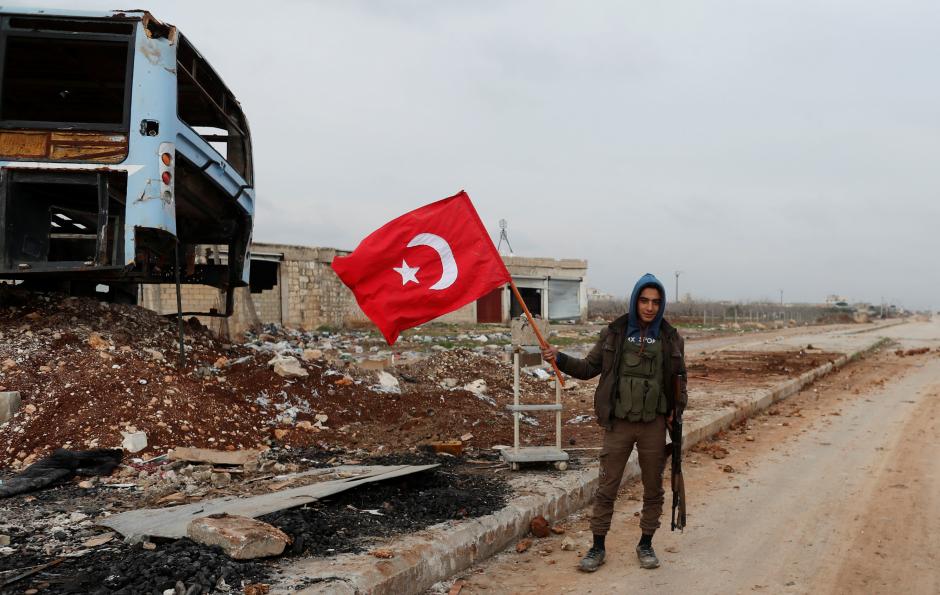Turkey sends troops to Syria
January 22, 2018 | Expert Insights

Turkish forces have entered northwestern Syria as they continue to attack a Kurdish militia called the YPG. The Turkish government has repeatedly noted that this group is a "terror army" that presents a danger to Turkish security.
What complicates this development is that this militia is considered one of the primary forces battling ISIS and is supported in part by the US government. There are multiple conflicts taking place currently in Syria.
Background
Over the span of several centuries, Syria, which was at the forefront of the Islamic Caliphate witnessed multiple invasions and occupations. The Romans to the Crusaders and the Turks have tried to gain control of the region.
The Syrian Civil War has been going on since 2011. It began during the Arab Spring protests and due to resentment towards the government of President Bashar al-Assad. The war is being fought by several factions: the Syrian government and its allies, a loose alliance of Sunni Arab rebel groups (including the Free Syrian Army), the majority-Kurdish Syrian Democratic Forces (SDF), Salafi jihadist groups (including al-Nusra Front) and the Islamic State of Iraq and the Levant (ISIL), with a number of countries in the region and beyond being either directly involved, or rendering support to one or another faction.
Until 2011, Turkey had a relatively friendly relationship with Syria. Once the civil unrest broke out, the Turkish government condemned the Syrian president Bashar Assad over the violent crackdown on protests in 2011. Turkey for many years has raised concerns about YPG. It is a mainly-Kurdish militia force in Syria and the primary component of the Democratic Federation of Northern Syria's Syrian Democratic Forces. Some have called it the "most effective" force in fighting ISIL in Syria.
Turkish President Recep Tayyip Erdogan has vowed to crush the YPG "very quickly". The nation believes that the group has links to the Kurdistan Workers Party (PKK), a banned militant group. It has also stated that this militia is a danger for its security.

Analysis
Turkish forces have entered northwestern Syria as they continue to attack a Kurdish militia called the YPG. The Turkish government has repeated noted that this group is a "terror army" that presents a danger to Turkish security.
YPG is considered one of Washington’s main ally in its war against ISIS and terror. However, Turkish President Recep Tayyip Erdogan, believes that YPG have ties to Kurdish separatist group in Turkey, the Kurdistan Workers' Party or PKK.
In order to aid in the offensive, Turkey has sent tanks and armored vehicles across the border with Syria to add to artillery and aerial invasions already underway against the YPG. The United States has trained YPG in the past to tackle ISIS. In fact, Washington considers YPG to be one of its main allies in the war against terror. US has long maintained that its assistance to YPG is only provided in regions where there is a stronghold by ISIS.
YPG has claimed that it has so far been able to hold off on the attack by Turkey, which has now been named Operation Olive Branch. "All the Turkish military's ground attacks against Afrin have been repelled so far and they have been forced to retreat," said YPG official Nouri Mahmoudi, according to Reuters. According to estimates, there are between 8,000 to 10,000 Kurdish YPG fighters in the Afrin area.
US Defense Secretary said that the US had been warned. "Turkey was candid," the defense secretary said on a flight to Asia, the Reuters report said. "They warned us before they launched the aircraft they were going to do it, in consultation with us. And we are working now on the way ahead. We'll work this out."
US has also urged Turkey to display restraint during the conflict. Meanwhile, Egypt and Iran have condemned Turkey's attack. Russia has urged restraint. The Turkish army has said it is targeting only "terrorist" positions and "utmost importance" was being given to not harm civilians.
Assessment
Our assessment is that this development threatens to broaden the scale of conflict taking place within Syria. It is already one of the most embattled regions in the world. This also complicates the relationship between US and Turkey. The two nations are members of NATO alliance and with this development, one NATO member is trying to take down a group which is trained and armed by another.








Comments